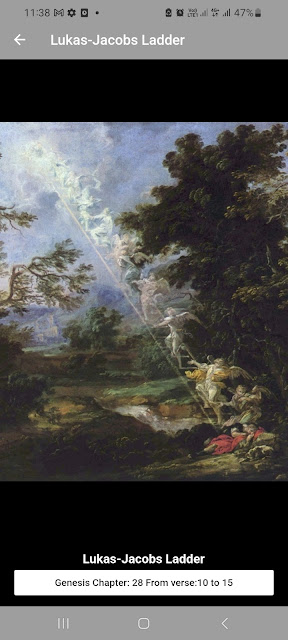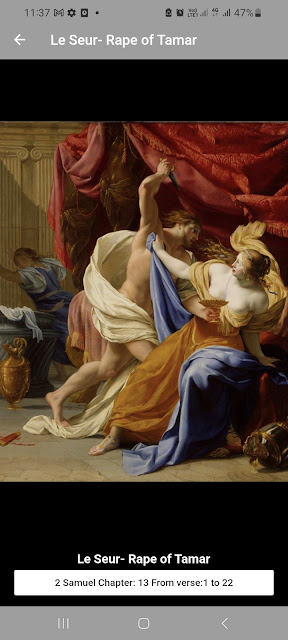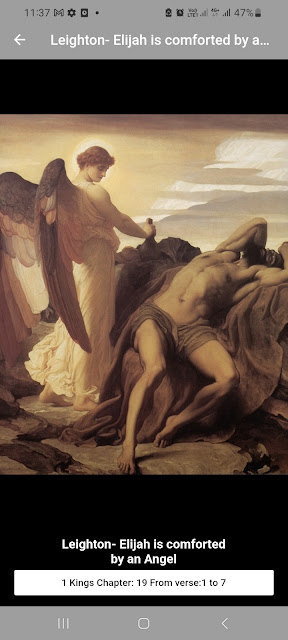If you are a Christian art fan, then our Biblical painting images app is for you. We have an android and ios version that encompasses almost 1,000 original works, starting in the renaissance period to more recent times.
a) Rape of Tamar 2 Sam 13: 1-22
View more Images here
Tamar was the daughter of King David by one of his wives. Her half-brother Amnon became infatuated with her, to the point where he became physically ill and could not eat. One of his advisors suggested that he find a way to be alone with Tamar, and so he told Tamar's father, King David, that he was sick and asked that Tamar come to make him some food. King David agreed and Tamar came to Amnon's room, where he then raped her.
After the rape, Amnon had a change of heart and despised Tamar. He told her to leave and she was sent away, torn and desolate. The news of what had happened spread throughout the kingdom and caused great outrage, especially among Tamar's brother Absalom. He vowed to take revenge on Amnon for what he had done to his sister.
Eventually, Absalom did seek revenge by killing Amnon at a feast. The rest of the story follows the aftermath of this murder and the consequences for Absalom and the rest of King David's family.
The story of the "Rape of Tamar" is a powerful and sobering example of the injustices and power imbalances that existed in biblical times. The story also highlights the dangers of lust and the devastating consequences of sexual violence. It is a reminder that even those in power and authority are not immune to committing wrongs and that such actions can have far-reaching effects.
b) Elijah comforted by an angel 1 Kings 19: 1-7
After the rape, Amnon had a change of heart and despised Tamar. He told her to leave and she was sent away, torn and desolate. The news of what had happened spread throughout the kingdom and caused great outrage, especially among Tamar's brother Absalom. He vowed to take revenge on Amnon for what he had done to his sister.
Eventually, Absalom did seek revenge by killing Amnon at a feast. The rest of the story follows the aftermath of this murder and the consequences for Absalom and the rest of King David's family.
The story of the "Rape of Tamar" is a powerful and sobering example of the injustices and power imbalances that existed in biblical times. The story also highlights the dangers of lust and the devastating consequences of sexual violence. It is a reminder that even those in power and authority are not immune to committing wrongs and that such actions can have far-reaching effects.
b) Elijah comforted by an angel 1 Kings 19: 1-7
This image shows Elijah being comforted by an angel and is a powerful one in the Bible for showing encouragement and hope to those who are feeling discouraged or alone.
After Elijah defeated the prophets of Baal and proved that the Lord was the true God, he fled for his life because Queen Jezebel threatened to kill him. He became exhausted and discouraged and asked the Lord to take his life. But an angel of the Lord came to him and touched him, telling him to rise and eat. The angel provided him with bread and water, and Elijah ate and drank before lying down again to sleep.
The angel then touched him again and told him to rise and eat, because the journey ahead of him was too great for him to make on his own strength. Elijah followed the angel's instruction and ate and drank, and then he travelled for forty days and forty nights to Horeb, the mountain of God.
At Horeb, Elijah found a cave and stayed there, feeling overwhelmed and alone. But the Lord spoke to him, asking him what he was doing there. Elijah explained that he had been very zealous for the Lord and that he felt he was the only one left who was faithful.
The Lord then spoke to Elijah and comforted him, telling him that he was not alone. The Lord said that there were still 7,000 others who had not bowed down to Baal and that Elijah's work was not done yet. The Lord also gave Elijah further instructions and strengthened him for the tasks ahead.
This story of Elijah being comforted by an angel is a reminder that even in our darkest moments when we feel alone and discouraged, the Lord is always with us and will provide us with the strength and comfort we need to continue on our journey.
c) Jacobs ladder Gen 28: 10-15
After Elijah defeated the prophets of Baal and proved that the Lord was the true God, he fled for his life because Queen Jezebel threatened to kill him. He became exhausted and discouraged and asked the Lord to take his life. But an angel of the Lord came to him and touched him, telling him to rise and eat. The angel provided him with bread and water, and Elijah ate and drank before lying down again to sleep.
The angel then touched him again and told him to rise and eat, because the journey ahead of him was too great for him to make on his own strength. Elijah followed the angel's instruction and ate and drank, and then he travelled for forty days and forty nights to Horeb, the mountain of God.
At Horeb, Elijah found a cave and stayed there, feeling overwhelmed and alone. But the Lord spoke to him, asking him what he was doing there. Elijah explained that he had been very zealous for the Lord and that he felt he was the only one left who was faithful.
The Lord then spoke to Elijah and comforted him, telling him that he was not alone. The Lord said that there were still 7,000 others who had not bowed down to Baal and that Elijah's work was not done yet. The Lord also gave Elijah further instructions and strengthened him for the tasks ahead.
This story of Elijah being comforted by an angel is a reminder that even in our darkest moments when we feel alone and discouraged, the Lord is always with us and will provide us with the strength and comfort we need to continue on our journey.
c) Jacobs ladder Gen 28: 10-15

View more Images here
The story of Jacob's ladder is found in Genesis 28:10-22. It tells the story of Jacob, who was on the run from his brother Esau and was travelling to his uncle's house. While he was on the journey, he had a dream in which he saw a ladder reaching from earth to heaven, and the angels of God were ascending and descending upon it.

View more Images here
The story of Jacob's ladder is found in Genesis 28:10-22. It tells the story of Jacob, who was on the run from his brother Esau and was travelling to his uncle's house. While he was on the journey, he had a dream in which he saw a ladder reaching from earth to heaven, and the angels of God were ascending and descending upon it.
In the dream, the Lord stood beside Jacob and spoke to him, saying, "I am the Lord, the God of Abraham your father and the God of Isaac; the land on which you lie I will give to you and your descendants." The Lord went on to promise Jacob that he would be a great nation and that his descendants would be as numerous as the dust of the earth.
The ladder in the dream is often interpreted as a symbol of the connection between heaven and earth, and between God and humanity. The angels ascending and descending on the ladder represent the movement of God's presence and grace into the world and the movement of humanity's prayers and offerings back to God.
The story of Jacob's ladder is a reminder that God is always with us, even in our darkest moments, and that we have a direct connection to God through prayer and worship. It is also a reminder of God's faithfulness to His promises and His covenant with His people.
e) Miriam's poem Exodus 15: 20-21
In the dream, the Lord stood beside Jacob and spoke to him, saying, "I am the Lord, the God of Abraham your father and the God of Isaac; the land on which you lie I will give to you and your descendants." The Lord went on to promise Jacob that he would be a great nation and that his descendants would be as numerous as the dust of the earth.
The ladder in the dream is often interpreted as a symbol of the connection between heaven and earth, and between God and humanity. The angels ascending and descending on the ladder represent the movement of God's presence and grace into the world and the movement of humanity's prayers and offerings back to God.
The story of Jacob's ladder is a reminder that God is always with us, even in our darkest moments, and that we have a direct connection to God through prayer and worship. It is also a reminder of God's faithfulness to His promises and His covenant with His people.
e) Miriam's poem Exodus 15: 20-21
View more Images here
This image depicts the poem of Miriam which is found in Exodus 15:21 and is considered one of the earliest recorded poems in the Bible. It is a song of triumph and celebration, sung by Miriam and the women of Israel after the Israelites' escape from Egypt and the drowning of Pharaoh's army in the Red Sea. The poem expresses Miriam's and the women's gratitude to God for His protection and deliverance and their joy at seeing God's power on display.
The poem consists of three stanzas, each with a similar structure and increasing in intensity. The first stanza speaks of God's victory over Pharaoh and the Egyptians and acknowledges His greatness and power. The second focuses on God's steadfast love and care for His people, and the final stanza declares the people's faith in God and their commitment to follow Him.
In the song, Miriam uses imagery from nature, such as the "deep waters" and "mountains" to depict God's might, and employs repetition and parallelism to reinforce her message. The poem also serves as a reminder to the Israelites of God's faithfulness and provision and encourages them to trust in Him as they journey towards the Promised Land.
Overall, the poem is considered an early example of Hebrew poetry and is significant for its celebration of God's power and love for His people. It remains an inspiring and uplifting piece of scripture that continues to be studied and celebrated today.
f) The deluge or flood Gen 7:1-24
This image depicts the poem of Miriam which is found in Exodus 15:21 and is considered one of the earliest recorded poems in the Bible. It is a song of triumph and celebration, sung by Miriam and the women of Israel after the Israelites' escape from Egypt and the drowning of Pharaoh's army in the Red Sea. The poem expresses Miriam's and the women's gratitude to God for His protection and deliverance and their joy at seeing God's power on display.
The poem consists of three stanzas, each with a similar structure and increasing in intensity. The first stanza speaks of God's victory over Pharaoh and the Egyptians and acknowledges His greatness and power. The second focuses on God's steadfast love and care for His people, and the final stanza declares the people's faith in God and their commitment to follow Him.
In the song, Miriam uses imagery from nature, such as the "deep waters" and "mountains" to depict God's might, and employs repetition and parallelism to reinforce her message. The poem also serves as a reminder to the Israelites of God's faithfulness and provision and encourages them to trust in Him as they journey towards the Promised Land.
Overall, the poem is considered an early example of Hebrew poetry and is significant for its celebration of God's power and love for His people. It remains an inspiring and uplifting piece of scripture that continues to be studied and celebrated today.
f) The deluge or flood Gen 7:1-24
View more Images here
The flood in the Bible, as described in the book of Genesis, is a story in which God decided to cleanse the earth of wickedness by sending a worldwide flood. He chose Noah to build an ark and gather two of every kind of animal and his family to be saved. The flood lasted 40 days and 40 nights and covered the entire earth. When the floodwaters receded, Noah and his family emerged from the ark to repopulate the earth. God made a covenant with Noah that he would never again destroy the earth with a flood and placed a rainbow in the sky as a symbol of this covenant. The story is often interpreted as either a historical account of a real flood or a symbolic story meant to convey the power of God and the consequences of sin and disobedience.
g) Laban searching for his household gods Gen 31: 31-36
View more Images here
In the story of Jacob in the book of Genesis, Jacob leaves Laban abruptly, taking his goods and the entire family with him. God told Jacob to return to the land of his ancestors and that he would be with him.
Jacob gathered his wives, children, and possessions and set out on his journey back to Canaan. When Laban learned of Jacob's departure, he pursued him with his servants, catching up with him in Gilead. Laban was angry with Jacob and accused him of stealing his household gods, which were highly valued and considered to be a symbol of family and tribal identity.
After a heated exchange, Jacob swore an oath that he did not know about the household gods and that if he had taken them, he would make restitution. Laban agreed and Jacob allowed him to search his possessions, but the household gods were not found.
However, Rachel, Jacob's wife, had taken the household gods and hidden them in her saddlebags. When Laban searched for the gods, he did not find them because Rachel had hidden them.
In the end, Jacob and Laban reached a peaceful agreement, and Jacob continued on his journey back to Canaan with his family and possessions.
Enjoy
Jacob gathered his wives, children, and possessions and set out on his journey back to Canaan. When Laban learned of Jacob's departure, he pursued him with his servants, catching up with him in Gilead. Laban was angry with Jacob and accused him of stealing his household gods, which were highly valued and considered to be a symbol of family and tribal identity.
After a heated exchange, Jacob swore an oath that he did not know about the household gods and that if he had taken them, he would make restitution. Laban agreed and Jacob allowed him to search his possessions, but the household gods were not found.
However, Rachel, Jacob's wife, had taken the household gods and hidden them in her saddlebags. When Laban searched for the gods, he did not find them because Rachel had hidden them.
In the end, Jacob and Laban reached a peaceful agreement, and Jacob continued on his journey back to Canaan with his family and possessions.
Enjoy





